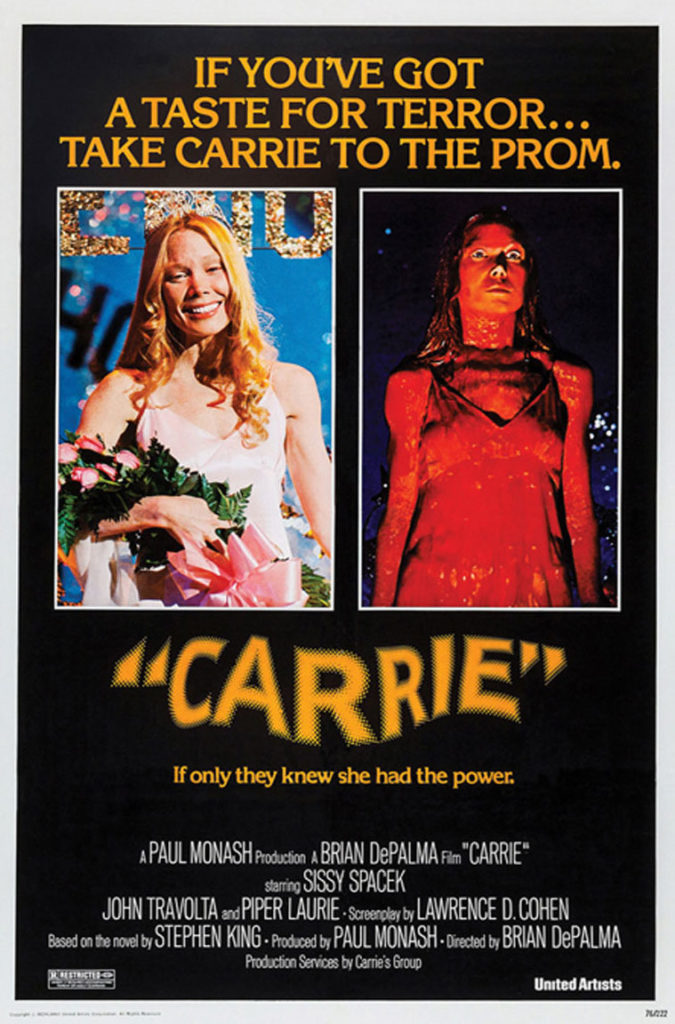How times have changed. Within two minutes of Brian De Palma’s Carrie, an adaptation of Stephen King’s first novel, there’s a scene in a girls’ high school locker room after gym class with no less than half a dozen full frontal nude shots. High school girls (all played by adults) are bouncing around and giggling after showering, showing off their gloriously naked bodies. I can’t imagine there would ever be a film made today that featured nude teenagers so prominently, much less with such sappy eloquence and, yes, sexuality. It’s not long before the camera pans and settles on the film’s main character, Carrie White (Sissy Spacek), as she showers and caresses her body, culminating in a horrific display of bullying after the onset of her first menstrual cycle. That’s how viewers are introduced to the confused, introverted, oppressed, overgrown adolescent of the title: as she is brutalized by her peers.
Carrie White is not just a victim at school. Her troubles originate at home, where she lives under the thumb of her crazy, abusive, fundamentalist Christian mother (Piper Laurie). Carrie has had a lifetime of being told by her mother that she is a sinner, unclean, evil, in league with the devil, and it has understandably left her with a bit of a complex. Add to this an emergent talent for telekinesis, and Carrie is a time bomb waiting to go off.
One of the girls that had tormented Carrie in the shower, Sue Snell (Amy Irving), feels guilty about what she did, and convinces her boyfriend, Tommy Ross (William Katt), to take Carrie to the prom as...as what? A way to get her to come out of her shell? A show of pity? It’s never made clear, but the motives of teenagers can be mysterious even to themselves, so it plays. Meanwhile, Carrie has developed a nemesis in Chris Hargensen (Nancy Allen), another of the girls involved in the locker room incident. She is the polar opposite of Sue. Rather than reach out to Carrie, or even just apologize to her, she decides to scheme with her boyfriend, Billy Nolan (John Travolta), to ruin Carrie’s life.
The film is broken into two distinct acts.  The events leading up to the prom are followed by the prom itself. Much of the short book was truncated in service to the film, but it’s a brilliant paring down. This was fairly early in De Palma’s career, but he had experience by this point, and we as viewers get to see a storyteller at his peak. There is no wasted moment in the film, and the pacing is perfect. It’s rapid, for sure, but steady, told in a style that requires no ebbs and flows to maintain balance. It’s a fascinating way to make a movie.
The events leading up to the prom are followed by the prom itself. Much of the short book was truncated in service to the film, but it’s a brilliant paring down. This was fairly early in De Palma’s career, but he had experience by this point, and we as viewers get to see a storyteller at his peak. There is no wasted moment in the film, and the pacing is perfect. It’s rapid, for sure, but steady, told in a style that requires no ebbs and flows to maintain balance. It’s a fascinating way to make a movie.
But the best parts of the film are the interplay among the characters. Chris and Billy, Tommy and Sue, and, of course, Carrie and her mother. Sissy Spacek and Piper Laurie were the heavyweights in this film. The scenes they shared, in those awful glimpses into Carrie’s home life, are the focal point around which this tempest of a film swirls. There wasn’t a whole pile of these scenes, not in a movie that moves so quickly, but it was these scenes that were most crucial for De Palma and company to get right, and they nailed it.
So much horror, especially that which centers around teenagers in angst, can be interminable. But Carrie is one of those films that shows if the subject is treated with the care afforded other films, there’s no reason for an inferior product to reach the screen. Story, direction, acting. When a film nails all three, there’s no possible way it can be bad.
